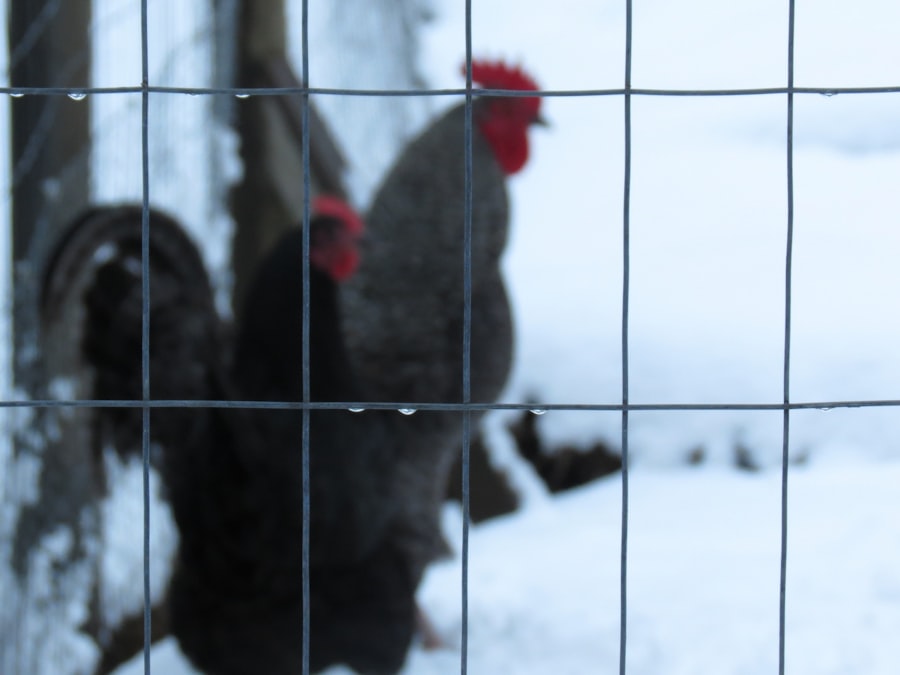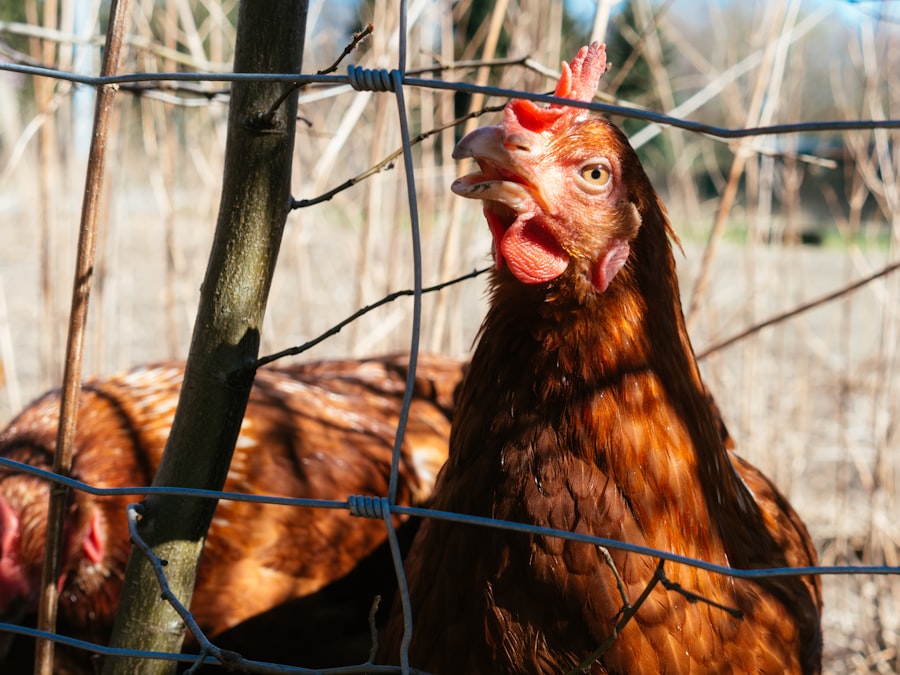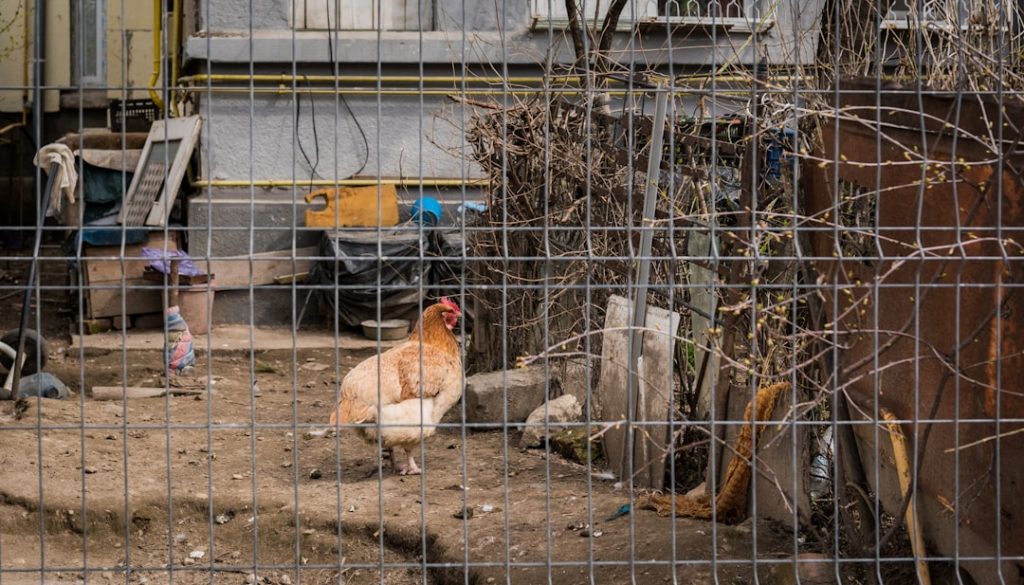Raising chickens presents both rewards and challenges. Predators pose a significant threat to chicken flocks, with foxes, raccoons, and birds of prey being common culprits. These animals not only endanger the chickens directly but can also introduce diseases and parasites.
Chickens’ inquisitive nature may lead them to explore hazardous areas or consume toxic plants if left unsupervised. Recognizing these risks is crucial for maintaining the health and safety of a chicken flock. Another concern for chicken owners is the possibility of theft.
Chickens and their eggs are valuable, making them potential targets for thieves. This can result in financial losses and emotional distress for the owner. By acknowledging these risks, chicken keepers can implement preventive measures to safeguard their flocks and minimize potential harm.
Table of Contents
Key Takeaways
- Understanding the Risks
- Predators such as foxes, raccoons, and birds of prey pose a threat to chickens.
- Disease and parasites can also pose risks to the health of chickens.
- Providing Adequate Fencing
- Use sturdy wire fencing with small gaps to prevent predators from entering the chicken enclosure.
- Ensure that the fencing extends both above and below ground to prevent digging and climbing predators.
- Creating Safe and Attractive Enclosures
- Provide shelter and roosting areas for chickens to protect them from the elements and predators.
- Keep the enclosure clean and well-maintained to prevent the buildup of waste and potential health risks.
- Utilizing Natural Deterrents
- Planting thorny bushes and using natural predators such as dogs or guard geese can help deter predators from approaching the chicken enclosure.
- Implementing Behavioral Training
- Train chickens to return to the coop at night and to recognize potential threats.
- Use positive reinforcement to encourage desired behaviors and discourage unwanted ones.
- Monitoring and Supervising the Chickens
- Regularly check the enclosure for signs of damage or potential entry points for predators.
- Supervise the chickens during free-range time to ensure their safety.
- Seeking Professional Help if Necessary
- If despite best efforts, predators continue to pose a threat, seek professional help from a veterinarian or animal control expert.
Providing Adequate Fencing
Why Fencing is Essential
One of the most effective ways to protect your chickens from predators and other risks is by providing adequate fencing. A sturdy fence can help keep out unwanted visitors and prevent your chickens from wandering into dangerous areas.
Choosing the Right Materials
When it comes to fencing, it’s important to choose materials that are strong and durable. Chicken wire is a popular choice for enclosing chicken coops, but it’s important to ensure that it is securely fastened and buried at least a foot into the ground to prevent predators from digging underneath.
Additional Options and Maintenance
In addition to traditional fencing, electric fencing can also be an effective deterrent for predators. Electric fencing delivers a mild shock to any animal that comes into contact with it, effectively deterring them from attempting to breach the enclosure. It’s important to regularly inspect and maintain the fencing to ensure that it remains effective in keeping predators at bay. By providing adequate fencing, you can create a safe and secure environment for your chickens to thrive.
Creating Safe and Attractive Enclosures

In addition to providing adequate fencing, creating safe and attractive enclosures for your chickens is essential for their well-being. A well-designed coop should provide protection from the elements, ample space for roosting and nesting, and easy access for cleaning and maintenance. It’s important to regularly inspect the coop for any signs of wear or damage and make any necessary repairs promptly.
Furthermore, providing enriching elements such as perches, dust baths, and toys can help keep your chickens entertained and reduce the risk of boredom-related behaviors such as feather pecking. Additionally, ensuring that the coop is well-ventilated and free from drafts can help prevent respiratory issues in your flock. By creating a safe and attractive enclosure, you can provide your chickens with a comfortable and secure living space.
Utilizing Natural Deterrents
In addition to physical barriers such as fencing, utilizing natural deterrents can help keep predators at bay. For example, planting thorny bushes or shrubs around the perimeter of the coop can create a natural barrier that deters predators from attempting to breach the enclosure. Additionally, installing motion-activated lights or sprinkler systems can startle predators and discourage them from approaching the coop.
Furthermore, some animals are naturally deterred by the presence of others. For example, keeping a guard dog or even a pair of geese can help deter predators from entering the area. These natural deterrents can be effective in reducing the risk of predation and creating a safer environment for your chickens.
Implementing Behavioral Training
Implementing behavioral training for your chickens can help reduce the risk of certain behaviors that may put them in danger. For example, training your chickens to return to the coop at nightfall can help prevent them from wandering into dangerous areas or becoming easy targets for predators. Additionally, training your chickens to come when called can make it easier to gather them in the event of an emergency.
Furthermore, providing positive reinforcement for desired behaviors such as using designated nesting boxes or perches can help encourage these behaviors and reduce the risk of injury or stress for your flock. By implementing behavioral training, you can help create a safer and more manageable environment for your chickens.
Monitoring and Supervising the Chickens

Early Detection of Health Issues
By regularly observing your flock, you can quickly identify any signs of illness or injury and provide prompt medical attention as needed. This proactive approach enables you to address potential health issues before they escalate into more severe problems.
Identifying Stressors and Environmental Hazards
Monitoring your chickens’ behavior can help you identify any potential stressors or environmental hazards that may need to be addressed. This includes recognizing signs of stress, such as changes in appetite or behavior, and taking steps to mitigate any negative impacts on their well-being.
Ensuring Safety During Free-Range Time
Supervising your chickens during free-range time is essential for their safety. By keeping a close eye on your flock, you can quickly intervene if any potential risks arise and take proactive measures to keep them safe. This includes preventing them from wandering into dangerous areas and ensuring they have access to a safe and healthy environment.
Seeking Professional Help if Necessary
Finally, if you encounter any challenges in keeping your chickens safe, don’t hesitate to seek professional help. Whether it’s consulting with a veterinarian about health concerns or enlisting the help of a professional animal behaviorist to address problematic behaviors, seeking expert guidance can help ensure the safety and well-being of your flock. Additionally, joining a local poultry association or online community can provide valuable resources and support from experienced chicken owners who can offer advice and guidance on keeping your flock safe.
By seeking professional help when necessary, you can ensure that you are equipped with the knowledge and resources needed to keep your chickens safe and healthy. In conclusion, understanding the risks associated with raising chickens is essential for creating a safe and secure environment for your flock. By providing adequate fencing, creating safe and attractive enclosures, utilizing natural deterrents, implementing behavioral training, monitoring and supervising the chickens, and seeking professional help when necessary, you can take proactive measures to protect your chickens from potential risks and ensure their well-being.
With careful planning and attention to detail, you can create a safe and enjoyable environment for your feathered friends to thrive.
If you’re looking for ways to keep free range chickens safe and away from the road, you may also be interested in learning about the benefits of renting a chicken coop. Renting a chicken coop can provide a secure and contained environment for your chickens, reducing the risk of them wandering onto the road. Check out this article on renting a chicken coop to learn more about this option for keeping your chickens safe.
FAQs
What are the risks of free range chickens being near the road?
Free range chickens near the road are at risk of being hit by passing vehicles, which can result in injury or death to the chickens and pose a hazard to drivers.
How can I keep free range chickens away from the road?
To keep free range chickens away from the road, you can use fencing to create a barrier between the chickens’ roaming area and the road. Additionally, providing ample space, shelter, and food within their designated area can help deter them from venturing near the road.
Are there any natural deterrents to keep free range chickens away from the road?
Some natural deterrents to keep free range chickens away from the road include planting dense shrubs or bushes along the roadside, which can create a physical barrier and discourage the chickens from venturing onto the road.
What are the benefits of keeping free range chickens away from the road?
Keeping free range chickens away from the road helps to ensure their safety and well-being, reduces the risk of accidents involving the chickens and passing vehicles, and minimizes potential disruptions to traffic flow.
Meet Walter, the feathered-friend fanatic of Florida! Nestled in the sunshine state, Walter struts through life with his feathered companions, clucking his way to happiness. With a coop that’s fancier than a five-star hotel, he’s the Don Juan of the chicken world. When he’s not teaching his hens to do the cha-cha, you’ll find him in a heated debate with his prized rooster, Sir Clucks-a-Lot. Walter’s poultry passion is no yolk; he’s the sunny-side-up guy you never knew you needed in your flock of friends!







